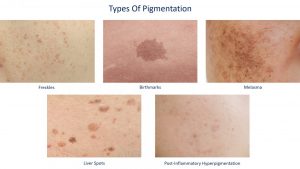Pigmentation issues are a common concern for many individuals, impacting the appearance and health of the skin. Dr. Bhavjit Kaur, an expert in pigmentation and other skin issues, offers valuable insights into understanding and addressing these concerns.
Introduction to Pigmentation Skin Concerns
Pigmentation refers to the colour of the skin, determined by the presence of melanin. While some level of pigmentation is normal and healthy, an imbalance can lead to various skin concerns.
Understanding the Causes of Pigmentation
Genetic Factors
Genetics play a significant role in determining an individual’s predisposition to certain pigmentation issues. Family history can increase the likelihood of developing conditions like melasma or vitiligo.
Sun Exposure
Excessive exposure to UV radiation from the sun can trigger the overproduction of melanin, leading to dark spots or sunspots on the skin.
Hormonal Changes
Fluctuations in hormone levels, such as during pregnancy or menopause, can cause melasma, a type of hyperpigmentation often referred to as the “mask of pregnancy.”
Inflammation and Trauma
Inflammatory skin conditions or trauma, such as acne or cuts, can result in post-inflammatory hyperpigmentation, leaving behind dark marks on the skin.
Different Types of Pigmentation
Hyperpigmentation
Melasma
Melasma presents as patches of dark, discoloured skin, commonly appearing on the face, particularly the cheeks, forehead, and upper lip.
Sunspots
Also known as solar lentigines or age spots, sunspots are dark spots that develop due to prolonged sun exposure, usually on areas exposed to the sun, like the face, hands, and shoulders.
Post-inflammatory Hyperpigmentation
This type of hyperpigmentation occurs as a result of inflammation or injury to the skin, often leaving behind dark marks or scars after the initial skin issue has healed.
Mixed Pigmentation
Freckles
Freckles are small, flat spots on the skin that are typically brown or tan in colour and often appear on sun-exposed areas, such as the face and arms.
Solar Lentigines
Similar to sunspots, solar lentigines are dark spots that develop due to sun exposure, but they tend to be larger and more irregular in shape.

Impact of Pigmentation on Skin Health
Pigmentation issues can not only affect the appearance of the skin but can also impact self-esteem and psychological well-being. Addressing these concerns can improve overall skin health and quality of life.
Treatment Options for Pigmentation
Several treatment options are available to manage pigmentation concerns, including topical treatments, laser therapy, chemical peels, and microdermabrasion. However, the effectiveness of treatment may vary depending on the type and severity of pigmentation.
Preventive Measures for Pigmentation
Taking preventive measures can help minimise the risk of developing pigmentation issues. This includes practicing sun protection, maintaining a regular skincare routine, and adopting healthy lifestyle habits.
Expert Advice from Dr. Bhavjit Kaur
Dr. Bhavjit Kaur emphasises the importance of seeking professional guidance for personalised treatment plans tailored to individual skin concerns. Through skin consultations at her clinics in London and Orpington, she provides expert advice and comprehensive care for pigmentation and other skin issues.
Pigmentation Treatment In London
Understanding the different types of pigmentation skin concerns is crucial for effective management and treatment. With proper preventive measures and expert guidance, individuals can achieve healthier, more radiant skin. To book a consultation with Dr Bhavjit Kaur, just follow this link.
FAQs on Pigmentation
- Can pigmentation issues be completely cured? While some pigmentation issues can be effectively managed, complete eradication may not always be possible. Treatment outcomes depend on various factors, including the type and severity of pigmentation.
- Are there any natural remedies for pigmentation? Certain natural ingredients, such as vitamin C may help reduce pigmentation when incorporated into skincare routines. However, their efficacy may vary, and it’s essential to consult with a skin expert for personalised recommendations.
- Can sun exposure worsen pigmentation? Yes, prolonged sun exposure can exacerbate pigmentation issues by stimulating melanin production. It’s crucial to protect the skin from UV radiation with sunscreen and protective clothing to prevent further pigmentation.
- Are pigmentation treatments safe for all skin types? Pigmentation treatments should be customised based on individual skin types and concerns to minimise the risk of adverse reactions. Consulting with a qualified professional is essential to ensure safe and effective treatment outcomes.

